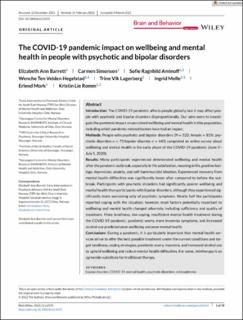| dc.contributor.author | Barrett, Elizabeth Ann | |
| dc.contributor.author | Simonsen, Carmen Elisabeth | |
| dc.contributor.author | Aminoff, Sofie Ragnhild | |
| dc.contributor.author | Hegelstad, Wenche | |
| dc.contributor.author | Lagerberg, Trine Vik | |
| dc.contributor.author | Melle, Ingrid | |
| dc.contributor.author | Mork, Erlend | |
| dc.contributor.author | Romm, Kristin Lie | |
| dc.date.accessioned | 2023-01-10T09:57:43Z | |
| dc.date.available | 2023-01-10T09:57:43Z | |
| dc.date.created | 2022-04-19T18:10:04Z | |
| dc.date.issued | 2022 | |
| dc.identifier.citation | Barrett, E. A., Simonsen, C., Aminoff, S. R., Hegelstad, W. T. V., Lagerberg, T. V., Melle, I., ... & Romm, K. L. (2022). The COVID‐19 pandemic impact on wellbeing and mental health in people with psychotic and bipolar disorders. Brain and Behavior, 12(5), e2559. | en_US |
| dc.identifier.issn | 2162-3279 | |
| dc.identifier.uri | https://hdl.handle.net/11250/3042231 | |
| dc.description.abstract | Introduction
The COVID-19 pandemic affects people globally, but it may affect people with psychotic and bipolar disorders disproportionally. Our aims were to investigate the pandemic impact on perceived wellbeing and mental health in this population, including which pandemic-related factors have had an impact.
Methods
People with psychotic and bipolar disorders (N = 520; female = 81%; psychotic disorders n = 75/bipolar disorder n = 445) completed an online survey about wellbeing and mental health in the early phase of the COVID-19 pandemic (June 5–July 5, 2020).
Results
Many participants experienced deteriorated wellbeing and mental health after the pandemic outbreak, especially in life satisfaction, meaning in life, positive feelings, depression, anxiety, and self-harm/suicidal ideation. Experienced recovery from mental health difficulties was significantly lower after compared to before the outbreak. Participants with psychotic disorders had significantly poorer wellbeing and mental health than participants with bipolar disorders, although they experienced significantly more worsening only of psychotic symptoms. Nearly half the participants reported coping with the situation; however, most factors potentially important to wellbeing and mental health changed adversely, including sufficiency and quality of treatment. More loneliness, low coping, insufficient mental health treatment during the COVID-19 pandemic, pandemic worry, more insomnia symptoms, and increased alcohol use predicted poor wellbeing and poor mental health.
Conclusions
During a pandemic, it is particularly important that mental health services strive to offer the best possible treatment under the current conditions and target loneliness, coping strategies, pandemic worry, insomnia, and increased alcohol use to uphold wellbeing and reduce mental health difficulties. For some, teletherapy is an agreeable substitute for traditional therapy. | en_US |
| dc.language.iso | eng | en_US |
| dc.publisher | Wiley | en_US |
| dc.rights | Navngivelse 4.0 Internasjonal | * |
| dc.rights.uri | http://creativecommons.org/licenses/by/4.0/deed.no | * |
| dc.title | The COVID-19 pandemic impact on wellbeing and mental health in people with psychotic and bipolar disorders | en_US |
| dc.title.alternative | The COVID-19 pandemic impact on wellbeing and mental health in people with psychotic and bipolar disorders | en_US |
| dc.type | Peer reviewed | en_US |
| dc.type | Journal article | en_US |
| dc.description.version | publishedVersion | en_US |
| dc.rights.holder | The author | en_US |
| dc.subject.nsi | VDP::Medisinske Fag: 700 | en_US |
| dc.source.journal | Brain and Behavior | en_US |
| dc.identifier.doi | 10.1002/brb3.2559 | |
| dc.identifier.cristin | 2017677 | |
| cristin.ispublished | true | |
| cristin.fulltext | original | |
| cristin.qualitycode | 1 | |

